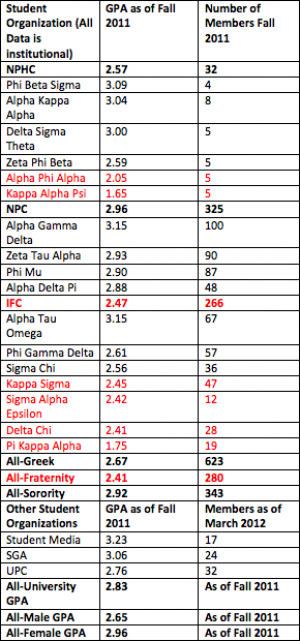Greek GPAs fall below standard, new guidelines set in place for fall semester
March 22, 2012
The academic performances of most Greek organizations at UNA fell from the spring semester to the fall semester last year, according to documents from the Office of Student Engagement.
The overall grade point average (GPA) of the Greek organizations as a whole dropped from 2.85 to 2.67, while the GPAs of the fraternities dropped from 2.69 to 2.41. The GPAs of the sororities also decreased from 3.0 to 2.92.
Out of the 10 UNA fraternities, six fraternities were below the standard 2.5 GPA set by the Office of Student Engagement, as was the average of UNA’s fraternities, though no sororities fell below the standard.
“They have sanctions that have been placed upon them,” said DeAnte’ Smith, assistant director of student engagement for Greek life, of the organizations that averaged below 2.5. “There are consequences when you fall below the 2.5 average. Generally, the overall thing is that it begins to limit, take away or overall zero their involvement socially.”
Smith said the main sanctions for the fraternities were set by the National Pan-Hellenic Council (NPHC) and the Interfraternity Council (IFC) so the actual sanctions could vary, but for example a chapter that earned less than a 2.5 GPA could be excluded from Step Show and other competitions.
This drop in GPAs also coincides with a new Greek standard created and initiated by Smith and Student Engagement.
“Starting this fall, 2012, we will implement Greek standards,” Smith said. “This spring semester we’ve given (the chapters) the Greek standards to look at the minimum standards we have, so they’ve had all semester to look at our minimum standards. They can be ready by fall to meet the standards, or there will be sanctions placed on them by the university.”
Smith said UNA hasn’t had concrete standards for the Greek organizations, but now there will be a five-year plan that will include a .1 increase of the GPA standard each year along with increased expectations of the Greek chapters.
Of the fraternities that fell below a 2.5 GPA, several have implemented changes to improve their academic standing.
After a former member received a zero GPA for the fall 2011 semester, Alpha Phi Alpha, which earned a 2.05 GPA, has implemented mandatory library hours to increase academic performance, said Theus Rowell, the chapter’s adviser.
Sigma Alpha Epsilon has also required mandatory library hours after falling below the 2.5 standard at a 2.42, according to adviser Justin Goads, and has also focused on improving record keeping on GPAs after a student with a high GPA went unrecorded in fall 2011.
Pi Kappa Alpha, which had a 1.75 GPA in fall 2011 and six members with a GPA below 0.5, has already begun steps to improve the chapter’s academic scores and their standing on campus, said Robert Tyree, the fraternity’s adviser.
Tyree said all members of the chapter have three mandatory study hall sessions and at least two hours of individual study a week, and through this several of the members have already reached a GPA above 3.0.
“We are going back to the basic core of our beliefs—academics come first,” Tyree said. “We’re going to scrutinize ourselves and return to the core values of not only our national organization but our local chapter. I know everyone views Alpha Tau Omega as the academic leaders of the campus, but I think Pi Kappa Alpha will return in short order.”
Alpha Tau Omega was tied for the highest GPA of all the Greek organizations at 3.15 with Alpha Gamma Delta.
“They’re keeping their eye on excellence instead of just being good enough,” said Adam Goodman, adviser for Alpha Tau Omega. “It’s an environment where you are set up to succeed. I do think, and that’s the hope, that they will have the tools to improve on what they already have.”
Pledges of Alpha Tau Omega scored lower than active members of the organization, with active members at an average of 3.26 and pledge members at 2.85. Active members of Alpha Gamma Delta made an average of 3.26 in fall 2011, while the pledges made an average of 3.06.
“Just the culture shock of coming to college makes it difficult,” said Pat Roden, faculty adviser for Alpha Gamma Delta, as to why pledges are making lower GPAs than active members. “Time management and just getting acclimated to the college campus is difficult for a general student. I think it’s just adjusting to college overall.
“Pledges also go through learning about the organizations. They do have more intense meetings than our current members do. You see it rise as they become acclimated to college.”
At UNA, a student needs a 2.0 GPA, which is the equivalent of an overall C, to graduate, but, according to Smith, graduation is not the only use of a high GPA, especially for Greek organizations.
“Generally, a lot of students that want to become a part of Greek do their research beforehand, so when they notice a higher GPA they feel more comfortable being a part of the organization,” Smith said. “This also helps the parents, because the parents are usually the people that finance the students. It’s easier for (the students) to say, ‘Look, this is an organization I want to be a part of,’ and then show (the parents) a high GPA.”
The advisers for Delta Chi, Kappa Sigma and Kappa Alpha Psi, the other fraternities that fell below a 2.5, were also contacted for the story but did not respond.
At press time, UNA’s Honors Society, the Gay Straight Alliance and Sports Information could not produce grade information.
Staff Writer Blythe Steelman contributed to this story.
To view all GPAs for Greek organizations at UNA, check here.
The new Greek standards can also be found here.



![Caleb Crumpton [COURTESY OF UNA SGA]](https://theflorala.com/wp-content/uploads/2024/07/caleb-crumpton-courtesy-of-SGA-425x600.jpg)






